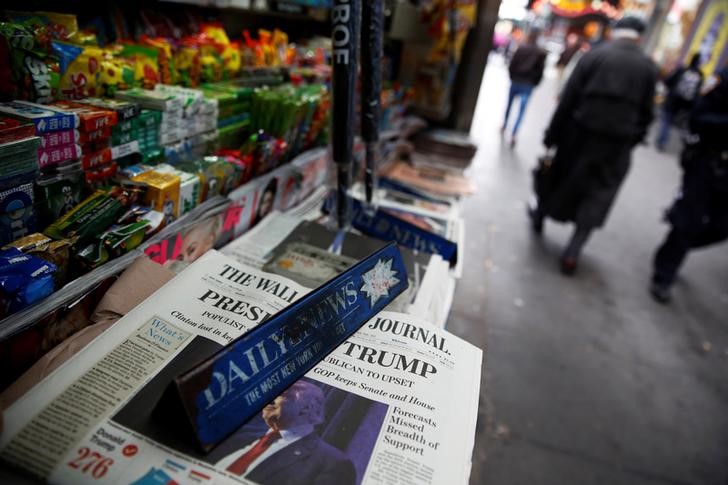By Rodrigo Campos
NEW YORK (Reuters) - The U.S. dollar climbed on Friday to its highest level since 2003 on continued bets on faster inflation and higher interest rates, while Treasuries resumed a selloff that left yields at their highest levels of the year.
A growing perception that the economic policies of U.S. President-elect Donald Trump will lift consumer prices pushed the dollar higher.
On Wall Street, the tech- and biotech-heavy Nasdaq Composite hit a record intraday high before slipping lower. The Dow industrials and S&P 500 were also near record highs despite the day's decline.
"I see the market kind of churning here because it's had a very decent move...," said Ken Polcari, director of the NYSE floor division at O’Neil Securities in New York. "The economy does still have to catch up to valuation, considering yields are higher and they're continuing to rise."
The Dow Jones industrial average (DJI) fell 35.89 points, or 0.19 percent, to 18,867.93, the S&P 500 (SPX) lost 5.22 points, or 0.24 percent, to 2,181.9 while the Nasdaq Composite (IXIC) dropped 12.46 points, or 0.23 percent, to 5,320.83.
The Russell 2000 index of small-cap stocks (RUT) closed higher for an 11th straight session, its longest such streak since 2003.
The pan-European FTSEurofirst 300 index (FTEU3) fell 0.54 percent, while MSCI's gauge of stocks across the globe (MIWD00000PUS) fell 0.51 percent.
Emerging market stocks (MSCIEF) fell 0.3 percent and remained near a four-month low hit Monday.
The U.S. dollar's rise against the yen <JPY=> raised hopes of an earnings boost to Japanese exporters, helping lift the Nikkei average (N225) to a 10-month high.
BOND SELLOFF RESUMES
Last week's unexpected U.S. election victory from political neophyte Trump has led to a repricing of assets, most notably in currency and bond markets.
Federal Reserve policymaker James Bullard said on Friday he is leaning towards supporting a rate rise in December, adding that a plethora of potential changes under Trump could affect future policy.
The euro <EUR=> fell 0.3 percent to $1.0593, while the yen
The dollar index (DXY) hit a high of 101.48, its highest level since April 2003. It has risen over 4 percent in the last two weeks, its biggest fortnightly rise since March 2015.
The election's outcome briefly spooked financial markets worldwide but they quickly reversed course as traders seized on tax cuts, deregulation and infrastructure spending which Trump campaigned on as positives for the greenback.
"It has caused a wave of dollar buying across the board," said Richard Scalone, co-head of foreign exchange at TJM Brokerage in Chicago.
To be sure, it is unclear how many if any of these proposals would materialize. Trump's stance on immigration and trade, if they become law, could hurt the dollar, analysts said.
The yield on U.S. benchmark 10-year Treasury notes (US10YT=RR) rose to 2.355 percent, which was the highest since December. Yields on Treasuries of all maturities have registered the largest two-week gains in more than five years as investors have dumped U.S. government debt since Election Day.
Benchmark 10-year notes (US10YT=RR) last fell 18/32 in price.
Oil prices settled higher, closing out a strong week amid growing expectations that OPEC will cap production.
Spot gold <XAU=> fell 0.6 percent to $1,209.00 an ounce. U.S. gold futures

Copper